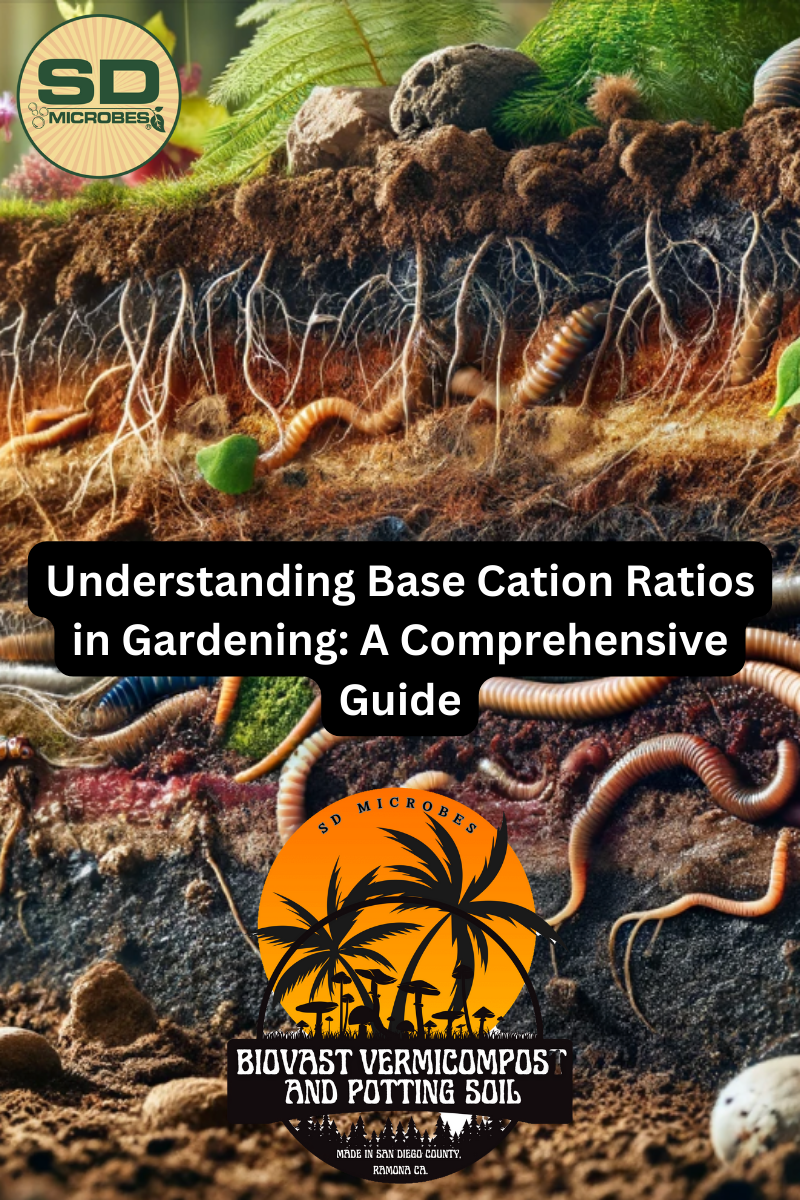
Understanding Base Cation Ratios in Gardening: A Comprehensive Guide
Share
Gardening, whether as a hobby or a professional endeavor, requires a keen understanding of soil health. One critical aspect often overlooked by many gardeners is the base cation ratio. This article will delve into what base cation ratios are, their significance in gardening, and how to manage them for optimal plant health and productivity.
What are Base Cation Ratios?:
Base cations are positively charged ions in the soil, essential for plant growth. The primary base cations include calcium (Ca²⁺), magnesium (Mg²⁺), potassium (K⁺), and sodium (Na⁺). These cations play crucial roles in plant nutrition, soil structure, and overall soil chemistry.
The base cation ratio refers to the relative proportions of these cations in the soil. This ratio is often expressed as a percentage of the soil's cation exchange capacity (CEC), which is the soil's ability to hold and exchange these nutrients. The ideal base cation saturation ratios are often debated, but a commonly referenced ideal range is:
- **Calcium (Ca²⁺):** 65-75%
- **Magnesium (Mg²⁺):** 10-15%
- **Potassium (K⁺):** 3-5%
- **Sodium (Na⁺):** 1-2%
The Importance of Base Cation Ratios:
Understanding and managing base cation ratios are vital for several reasons:
1. **Nutrient Availability:** Proper cation ratios ensure that essential nutrients are available to plants. For instance, an imbalance, such as excess calcium, can hinder the uptake of magnesium and potassium, leading to deficiencies.
2. **Soil Structure:** Cations like calcium help in flocculating soil particles, improving soil structure, aeration, and water infiltration. Conversely, an excess of sodium can lead to soil dispersion, resulting in poor structure and drainage issues.
3. **pH Regulation:** Base cations help regulate soil pH. Calcium and magnesium are crucial for maintaining a neutral pH, while an imbalance can lead to either acidic or alkaline soil conditions, both of which can adversely affect plant growth.
4. **Microbial Activity:** Healthy base cation ratios support beneficial microbial activity in the soil, enhancing nutrient cycling and overall soil fertility.
Managing Base Cation Ratios in Your Garden
1. **Soil Testing:** The first step in managing base cation ratios is conducting a comprehensive soil test. This test will provide detailed information on the levels of various cations and the soil's CEC.
2. **Amendments:**
- **Calcium:** If calcium is deficient, amendments like gypsum (calcium sulfate) or lime (calcium carbonate) can be added. Gypsum is preferred when you do not want to raise the soil pH.
- **Magnesium:** Dolomitic lime, which contains both calcium and magnesium, is a common amendment for low magnesium soils. Epsom salt (magnesium sulfate) is another option that does not affect soil pH.
- **Potassium:** Potassium deficiencies can be corrected with potash (potassium chloride or potassium sulfate). Organic options include compost and greensand.
- **Sodium:** Typically, sodium is not added deliberately to soils due to its potential to cause structural issues. However, in areas with naturally high sodium levels, leaching with good-quality water or adding gypsum can help mitigate its effects.
3. **Balancing Ratios:** Adjusting one cation can affect others due to the competitive nature of cation exchange. For example, adding too much lime to increase calcium can reduce magnesium availability. Therefore, it’s crucial to make adjustments based on comprehensive soil test results and often consult with a soil scientist or agronomist.
Practical Tips for Gardeners:
- **Regular Monitoring:** Soil conditions can change over time due to factors like weather, irrigation, and plant uptake. Regular soil testing and monitoring help in making timely adjustments.
- **Organic Matter:** Incorporating organic matter, such as compost, can improve soil structure and cation exchange capacity, indirectly supporting better cation balance.
- **Irrigation Management:** Avoiding excessive watering and ensuring proper drainage can help prevent leaching of essential cations and maintain soil structure.
Conclusion:
Base cation ratios are a fundamental aspect of soil health and fertility. Understanding and managing these ratios can significantly impact plant growth, soil structure, and overall garden productivity. By conducting regular soil tests, applying appropriate amendments, and maintaining organic matter, gardeners can ensure their soil provides the optimal environment for healthy and productive plants.
By paying attention to base cation ratios, gardeners can take a more scientific approach to soil management, leading to more vibrant and fruitful gardens.